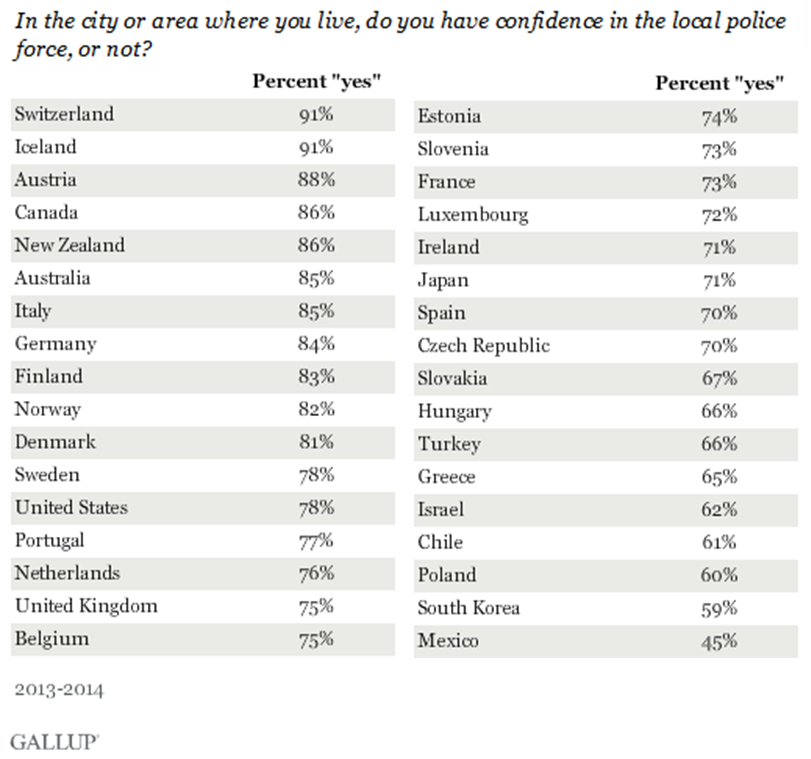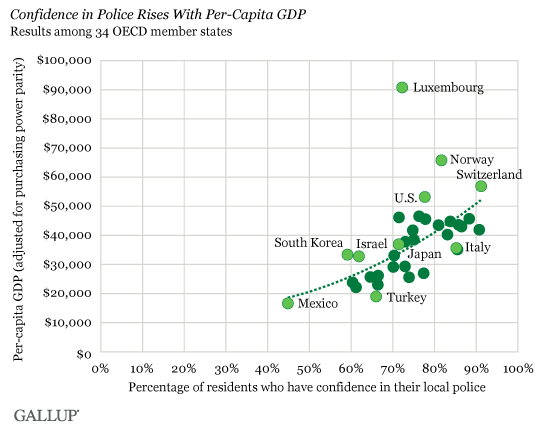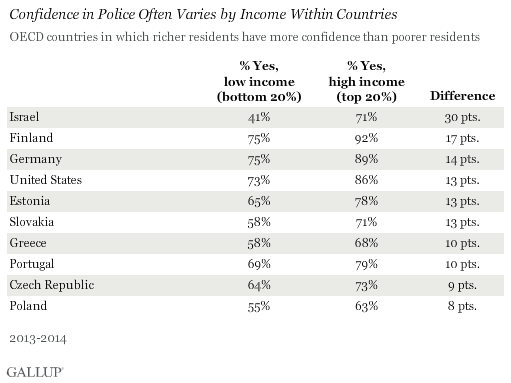Story Highlights
- Among OECD countries, a median 74% confident in local police
- Confidence rises with a country's per-capita GDP
- In 10 OECD states, richer residents are more confident
WASHINGTON, D.C. -- Policing standards have become a high-profile issue in the U.S. amid widespread protests over the failure to indict two white police officers in the deaths of unarmed black men. Compared with residents of other generally high-income and democratic countries in the Organization for Economic Cooperation and Development (OECD), Americans' confidence in their local police falls in about the middle of the pack.

Among the 34 OECD member states, all of which were surveyed in 2013 and 2014, a median 74% of residents say they have confidence in their local police. In the U.S., where this question was last asked in December 2013, the figure is 78%. It's possible that this figure has changed in the wake of the recent protests in the U.S., but confidence has been extremely stable -- in the 78% to 81% range -- since 2005. The measure used in this study is based on confidence on residents' local police, and is different from other U.S. Gallup measures that ask residents about their confidence in the police in general.
Gallup World Polls demonstrate the extent to which residents' confidence in police is related to their country's per-capita GDP (adjusted for purchasing-power parity). Mexico, one of the poorest OECD countries, is also the one most plagued by crime and violence. Less than half of Mexicans (45%) have confidence in their local police force -- about half the proportion seen in Switzerland (91%), where per-capita GDP is among the highest in the world. (Data collection in Mexico took place before the September 2014 abduction of 43 students in Iguala, Mexico, by local police, who then allegedly turned the students over to a local gang to be murdered.) Luxembourg, by far the OECD's richest country, is something of an outlier with 72% confident.

The relationship between prosperity and effective policing reflects a larger truth long recognized by economists: Strong rule of law promotes economic development in a multitude of ways. Among the most fundamental is that it allows business owners to have confidence that their assets will not be under constant threat of theft, or that they will not be targets of extortion by organized crime outfits. Economic development, in turn, strengthens the rule of law by allowing countries to spend more on enforcement, including the presence of a capable, trustworthy police force in every community.
Confidence in Police Often Varies by Residents' Income Within Countries
In 10 OECD countries -- including the U.S. -- residents' confidence in their local police also varies significantly by their relative affluence within the country. In other words, more-affluent residents are more likely to be confident than those who are poor. The difference is widest by far in Israel, where 71% of those in the richest 20% have confidence in their local police, vs. 41% of those in the poorest 20%.

In Israel, as in the U.S. and many other countries, class-based differences are intertwined with differences between racial or religious groups. Two of the poorest groups in Israel are ultra-Orthodox (Haredi) Jews and Muslims. Confidence in police is much lower among these groups, at 38%, than among all other Israelis (68%). Reminiscent of the situation among African-Americans and Latinos in the U.S., members of these groups are often clustered in low-income communities with high crime rates. As author Shmuel Rosner wrote in a 2013 New York Times column, "Every country and every society has a problem of solidarity between rich and poor. But in Israel, societal rifts along religious and ethnic lines are exacerbated by the lack of trust between the different groups."
Bottom Line
Law and order is one of the most fundamental requirements for a prosperous, harmonious society. But if police are to do their jobs effectively, they need the trust and cooperation of community members. As these results demonstrate, that trust varies considerably by income, both between and within counties. For developing countries, these data illustrate the need to continually invest in strengthening the rule of law to maintain economic momentum.
Differences within countries may be even tougher to address, as evidenced by the situation in Israel, as well as the U.S. and other nations. Particularly when class-based differences are reinforced by racial or religious fissures, local law enforcement officials may need to work particularly hard to maintain trusting relationships with those they serve.
Survey Methods
Results are based on telephone interviews with approximately 1,000 adults in all countries except Mexico, where interviews were conducted face to face. All surveys were conducted between April 2013 and October 2014. For results based on each total sample of national adults, the margin of sampling error range from ±3.4 percentage points to ±4.1 percentage points at the 95% confidence level. All reported margins of sampling error include computed design effects for weighting.
For more complete methodology and specific survey dates, please review Gallup's Country Data Set details. Learn more about how the Gallup World Poll works.

